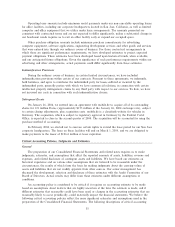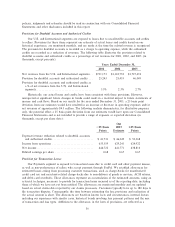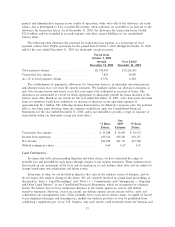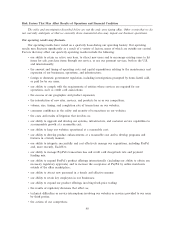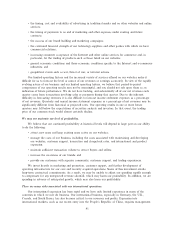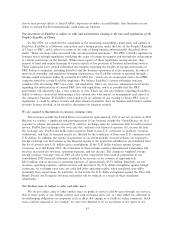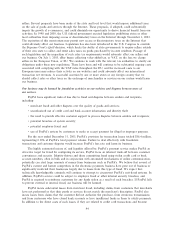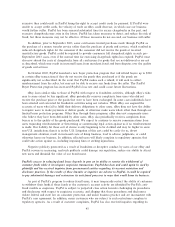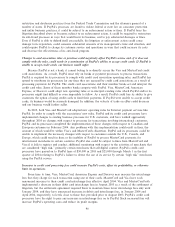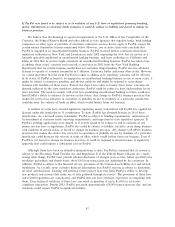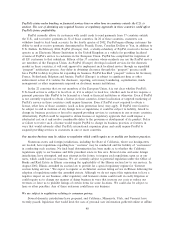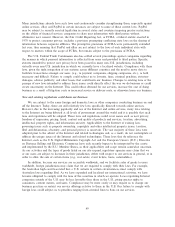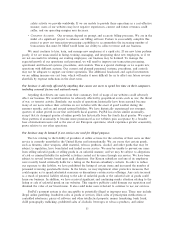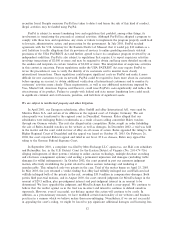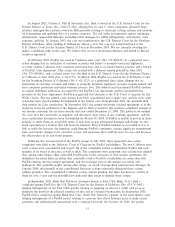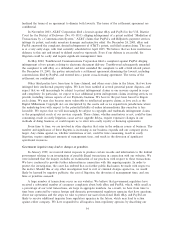eBay 2003 Annual Report Download - page 46
Download and view the complete annual report
Please find page 46 of the 2003 eBay annual report below. You can navigate through the pages in the report by either clicking on the pages listed below, or by using the keyword search tool below to find specific information within the annual report.sellers. Several proposals have been made at the state and local level that would impose additional taxes
on the sale of goods and services through the Internet. These proposals, if adopted, could substantially
impair the growth of e-commerce, and could diminish our opportunity to derive Ñnancial beneÑt from our
activities. In 1998 and 2000, the U.S. federal government enacted legislation prohibiting states or other
local authorities from imposing access or discriminatory taxes on the Internet through November 1, 2003.
The expiration of this moratorium may permit new access or discriminatory taxes on the Internet that
could adversely aÅect our business. Legislation has also been introduced in the U.S. Congress to override
the Supreme Court's Quill decision, which limits the ability of state governments to require sellers outside
of their own state to collect and remit sales taxes on goods purchased by in-state residents. Passage of
such legislation and the imposition of such sales tax requirements would adversely aÅect our sellers and
our business. On July 1, 2003, eBay began collecting value-added tax, or VAT, on the fees we charge
sellers in the European Union, or EU. We continue to work with the relevant tax authorities to clarify our
obligations under these new regulations. There have been and will continue to be substantial ongoing costs
associated with complying with the VAT rules throughout the EU, and the increased costs to our
European users may reduce their activity on our websites and could adversely aÅect our international
transaction net revenues. A successful assertion by one or more states or any foreign country that we
should collect sales or other taxes on the exchange of merchandise or services on our system would harm
our business.
Our business may be harmed by fraudulent activities on our websites and disputes between users of
our services.
PayPal faces signiÑcant risks of loss due to fraud and disputes between senders and recipients,
including:
‚ merchant fraud and other disputes over the quality of goods and services;
‚ unauthorized use of credit card and bank account information and identity theft;
‚ the need to provide eÅective customer support to process disputes between senders and recipients;
‚ potential breaches of system security;
‚ potential employee fraud; and
‚ use of PayPal's system by customers to make or accept payment for illegal or improper purposes.
For the year ended December 31, 2003, PayPal's provision for transaction losses totaled $36.4 million,
representing 0.30% of PayPal's total payment volume. Failure to deal eÅectively with fraudulent
transactions and customer disputes would increase PayPal's loss rate and harm its business.
The highly automated nature of, and liquidity oÅered by, PayPal's payment service makes PayPal an
attractive target for fraud. In conÑguring its service, PayPal faces an inherent trade-oÅ between customer
convenience and security. Identity thieves and those committing fraud using stolen credit card or bank
account numbers, often in bulk and in conjunction with automated mechanisms of online communication,
potentially can steal large amounts of money from businesses such as PayPal's. We believe that several of
PayPal's current and former competitors in the electronic payments business have gone out of business or
signiÑcantly restricted their businesses largely due to losses from this type of fraud. We expect that
technically knowledgeable criminals will continue to attempt to circumvent PayPal's anti-fraud systems. In
addition, PayPal's service could be subject to employee fraud or other internal security breaches, and
PayPal is required to reimburse customers for any funds stolen as a result of such breaches. If PayPal fails
to prevent external or internal fraud, our business will be harmed.
PayPal incurs substantial losses from merchant fraud, including claims from customers that merchants
have not performed or that their goods or services do not match the merchant's description. PayPal also
incurs losses from claims that the customer did not authorize the purchase, from erroneous transmissions
and from customers who have closed bank accounts or have insuÇcient funds in them to satisfy payments.
In addition to the direct costs of such losses, if they are related to credit card transactions and become
44



